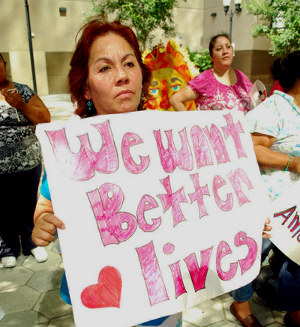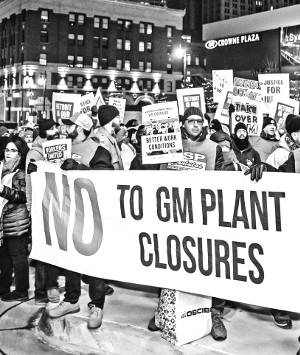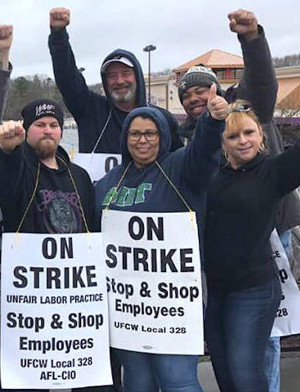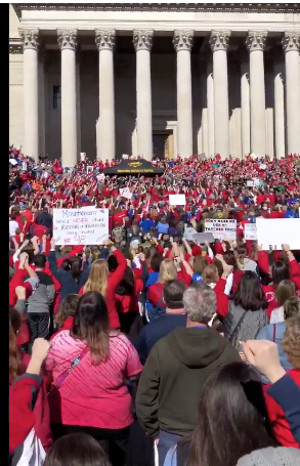 May Day commemorates the battles for the 8-hour day from 1886 and afterward. It is recognized the world over as the day when workers and their organizations reflect on and summarize their experiences, and strategize about what direction to take going forward.
May Day commemorates the battles for the 8-hour day from 1886 and afterward. It is recognized the world over as the day when workers and their organizations reflect on and summarize their experiences, and strategize about what direction to take going forward.
The working class struggles are influenced by the fight of workers as workers, and by the struggles based on how workers live in their communities and the rights extended to or denied to the various sectors of the working class.
The crisis of capitalism continues to affect the entire globe—economic, social and political conditions are changing dramatically. Many factors influence the speed and depth of those changes, and one of the most fundamental is the application of technology to production. The transition away from national agricultural economies and peasant production to mechanized and globalized agricultural production has driven millions off the farms to the cities, and to migrate to other countries. These changes are affecting whole continents.
 Technology has also been eliminating jobs by the tens of thousands for the last 50 years. In the United States this has devastated whole cities, and certain communities especially, and more recently it has affected all communities and sectors of the working class.
Technology has also been eliminating jobs by the tens of thousands for the last 50 years. In the United States this has devastated whole cities, and certain communities especially, and more recently it has affected all communities and sectors of the working class.
As a result, workers are finding new and creative ways to fight. The communities first affected by the economic crisis came under attack and were isolated from other sectors of the working class by those attacks. As minorities, as women, and as immigrants (to name a few), the expansion of their rights and advances has been systematically blocked or has suffered setbacks. Discrimination, police attacks and denial of services and opportunities (over affordability) are obscured by the media’s anti-working class propaganda.
 On the front of workers as workers, in 2018, there were 20 major work stoppages involving 485,000 workers. This was the highest number of major work stoppages since 2007, when there were 21. The number of workers involved in 2018 was the highest since 1986, when 533,000 workers were involved in work stoppages. This is an interesting development.
On the front of workers as workers, in 2018, there were 20 major work stoppages involving 485,000 workers. This was the highest number of major work stoppages since 2007, when there were 21. The number of workers involved in 2018 was the highest since 1986, when 533,000 workers were involved in work stoppages. This is an interesting development.
On the other hand, the social struggles are evolving in such a way as to influence the development of an awareness and consciousness that can lead to a new revolutionary plan of transformation. Increasingly, the immigration struggle is not just for the undocumented. The police killings of African Americans and the discrimination and isolation associated with them is not simply a question for African Americans, but of moral and political significance for the entire working class. There are indications of this development for the other sectors as well, and many are emerging daily.
 This is becoming obvious from the discussions around the elections. Many candidates and representatives of the fronts of struggle are beginning to articulate the reshaping of our strategy and tactics in the form of programs for solving our problems through transforming the political and economic system. Those of us in the fight should do everything we can to keep it on track toward where it is already headed historically—a whole new society that puts the needs of the workers first.
This is becoming obvious from the discussions around the elections. Many candidates and representatives of the fronts of struggle are beginning to articulate the reshaping of our strategy and tactics in the form of programs for solving our problems through transforming the political and economic system. Those of us in the fight should do everything we can to keep it on track toward where it is already headed historically—a whole new society that puts the needs of the workers first.
May Day: Fight for a new society beginning to take shape
Latest
The People’s Tribune opens its pages to voices of the movement for change. Our articles are written by individuals or organizations, along with our own reporting. Bylined articles reflect the views of the authors. Articles entitled “From the Editors” reflect the views of the editorial board. Please credit the source when sharing: peoplestribune.org. Please donate to help us keep bringing you voices of the movement for change. Click here. We’re all volunteer, no paid staff. The People’s Tribune is a 501C4 organization.
